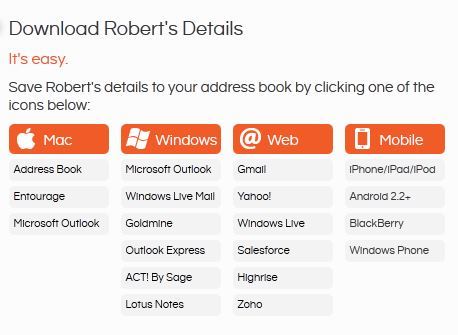Warning: You might just go ape over ContactMonkey. It lets you provide your contact information to others in a way that makes it easy for them to add you to their contacts — no matter what program they use for their contacts and no matter what device or operating system they are on.

Visitors to my profile need just click to add me to their contacts.
You get a unique web address for your contact information. Put the address in your email signature, on your business card, on your website, or wherever. When someone goes to that page, they see your full contact information.
But the better part is what they see on the right side of the screen. It shows a list of 19 common contacts applications for Mac, Windows, Web and mobile. (See image to right.) The user need only click on the one he or she uses and, voilà, your information is added to the person’s contacts.
Try it with mine, if you like. I am at contactmonkey.com/ambrogi.
ContactMonkey has other nice features:
- Reports. You get reports showing downloads of your contact information. If the downloader was a registered user of ContactMonkey, you see the name. If not, you see only the downloader’s browser type and location and the time and date of the download.
- Web page widget. Put your ContactMonkey information on your website or blog.
- Notices of updates. When someone downloads your contact info, the person is also given the option of “subscribing” to your profile, so that if you make changes, the user gets notified by email.
- QR code. You get a QR code for your contact page that you can add to business cards or elsewhere.
Everything I’ve described so far is free. ContactMonkey also offers a “white-label edition” for businesses at a price of $3 per user per month. The white-label service includes:
- A branded contacts site for your company that is reached through a subdomain of your URL. Thus, your company’s main contact page would be http://contacts.yourcompany.com and each employee would have a unique URL for his or her contact info, such as http://contacts.yourcompany.com/JohnSmith.
- The ability to manage your company’s contacts from your own server, using either Active Directory (for Windows servers) or a custom integration using ContactMonkey’s API.
- The ability to designate administrators to manage your company’s contacts and track the reports.
One other point worth noting is that you can set the privacy level of your contact information. There are three choices:
- Public, meaning anyone can see your contact page and search engines can index it.
- Discreet, meaning anyone can see your page, but search engines can’t crawl it.
- Private, meaning you must give someone your privacy code (which you create) before they can view your page.
There are other tools that let you share your contact information — the classic vCard being the most ubiquitous. But the others lack the versatility and ease of use of ContactMonkey. I like the ability to add a contact with just one click. You might even say I’m bananas about it.
 Robert Ambrogi Blog
Robert Ambrogi Blog